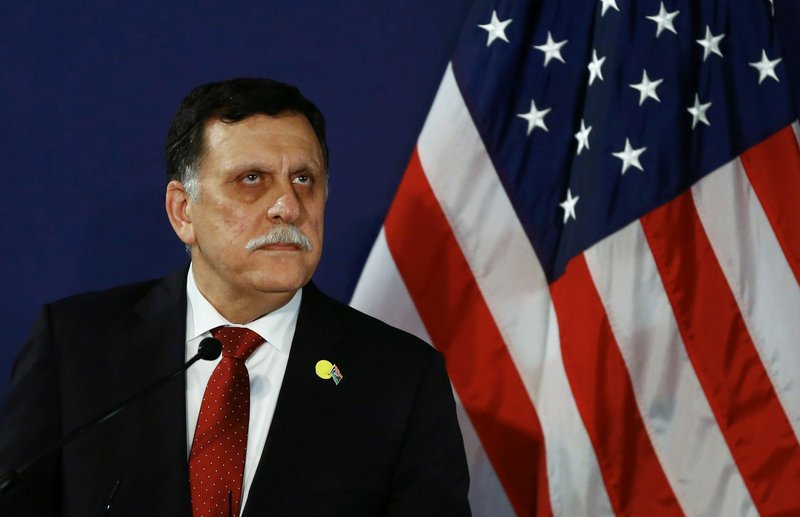The United States launched multiple airstrikes against Islamic State militants in Libya on Monday, opening a new front against the group at the request of the United Nations-backed government, Libyan and U.S. officials said.
Fayez Serraj, the head of Libya's U.N.-brokered presidency council, said in a televised statement that U.S. warplanes attacked the Islamic State bastion of Sirte on the coast of northern Libya. No U.S. ground forces will be deployed, he said.
The strikes, which targeted an Islamic State tank and vehicles, come amid growing concerns about the group's increased threat to Europe and its ability to inspire attacks across the region. At the same time, the Islamic State's numbers have been said to be shrinking in the Middle East and in Libya because of attacks from local forces and allied international troops.
"The presidency council, as the general army commander, has made a request for direct U.S. support to carry out specific airstrikes," Serraj said. "The first strikes started today in positions in Sirte, causing major casualties."
The strikes mark the start of a more active American role in the fight against the Islamic State in Libya, as the U.S. steps in to assist the fragile, U.N.-backed government. Monday's airstrikes were the first by the U.S. on the group's Libya branch since February.
In February, American F-15E fighter-bombers struck an Islamic State training camp in rural Libya near the Tunisian border, killing more than 40 people.
Libya slid into chaos after the ouster and killing of leader Moammar Gadhafi in 2011. The power and security vacuum left the country a breeding ground for militias and for militants including the Islamic State and al-Qaida affiliates.
Since 2014, Libya has been split between rival governments and parliaments based in the western and eastern regions, each backed by different militias and tribes.
The U.N. in December brokered a deal that tried to mend the rift by creating a presidency council and a unity government. The deal calls for a transitional period of up to two years, followed by a vote on a draft constitution and then presidential or parliamentary elections.
Libya's pro-government militias -- mainly from the western city of Misrata -- have been waging an offensive against the Islamic State in Sirte since May, but it has recently stalled.
Joining the coalition
President Barack Obama's authorization for action in Sirte covers airstrikes, intelligence and surveillance, but not ground operations, according to a White House official who wasn't authorized to speak publicly about the strikes and requested anonymity.
In a statement, Pentagon spokesman Peter Cook said Obama authorized the strikes after a recommendation from Defense Secretary Ashton Carter and Gen. Joseph Dunford, chairman of the Joint Chiefs of Staff.
"They are consistent with our approach to combating ISIL by working with capable and motivated local forces," said Cook, using an acronym for the Islamic State.
Serraj said his government is joining the coalition against the Islamic State, adding, "This is the time for the international community to live up to its promises to the Libyan people."
Serraj noted that the strikes will not go beyond Sirte and its surroundings. He said that any other foreign intervention is not allowed without coordination.
U.S., French, British and Italian special operations forces and military experts have been assisting Libyan troops fighting Islamic State militants in eastern and western Libya.
Although U.S. and allied warplanes have been conducting strikes for two years in Iraq and Syria, its actions against the Islamic State's Libya affiliate, which officials have in the past described as its most powerful branch, have been limited to a small number of targeted airstrikes since last year, including a November 2015 attack on the affiliate's leader.
The U.S. also is conducting periodic strikes on Islamic State targets in Afghanistan.
Militants seized Sirte in early 2015 and have sought to transform it into an annex of its so-called caliphate. Since May, pro-government forces, led by militias from Misrata, have targeted the extremists from three sides of the city and implemented a naval blockade to prevent fighters from fleeing. Within weeks, the militias liberated large sections of the city along the Mediterranean Sea.
But the Islamic State fighters have managed to keep a stiff resistance, deploying snipers and roadside bombs and setting up booby traps for the pro-government militias, slowing their advance and preventing them from asserting control of the whole city.
Dunford estimated in mid-July that there were only a few hundred militants still inside Sirte, which the Libyan group has used as its headquarters.
"I don't think there is any doubt that the Islamic State in Libya is weaker than it was some months ago," said Dunford, adding, "They've suffered significant casualties in and around the Benghazi area."
Without mentioning any future U.S. military plans in Libya, Dunford said that "whatever actions we conduct," aside from those meant to eliminate an Islamic State threat to the U.S. homeland, "are going to be in conjunction with" the U.N.-backed government.
U.S. officials earlier this year estimated there were as many as 6,000 Islamic State insurgents in Libya, including some who have abandoned Syria. But in recent months, officials say, the militants' numbers in Libya have dropped and the group is weakening there because of pressure from militias and the U.N.-brokered government.
Last week, U.N. Secretary-General Ban Ki-moon said Islamic State fighters in Libya are facing the "distinct possibility" of defeat in their last stronghold.
Information for this article was contributed by Lolita C. Baldor, Maggie Michael, Josh Lederman and Robert Burns of The Associated Press and by Missy Ryan, Sudarsan Raghavan and Thomas Gibbons-Neff of The Washington Post.
A Section on 08/02/2016

